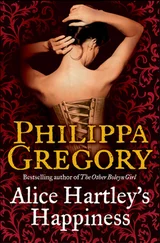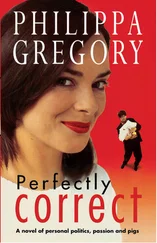She waited to see if I had an answer to that sad-voiced condemnation and then she went out to her room. I pursed my lips as if I had a sour taste in my mouth. And then I opened that bursting drawer and took out the bills to look at them again.
The news of the forestalled corn went fast around Wideacre and Celia’s was merely the first of three visits I had to endure. She was in some ways the hardest to answer because she feared me now not at all, and her honest brown eyes had a certain knack of looking at me as if she could not believe what she saw.
My second visitor was easier to manage. It was Dr Pearce, the Acre Vicar, who entered with apologies for disturbing me, but would I make allowances for a worried man?
He knew who paid his tithes and he was anxious not to offend me. But he was driven, like Celia, by the poverty that met his eyes every day in Acre. He could not, like Harry and me, simply avoid the village. He lived there, and his high-walled garden was no refuge when children cried for hunger in the lane that ran before his house.
‘I hope you do not think I am exceeding my position,’ he said nervously. ‘I hold no brief for improvidence. No one who knows me or my connections could ever doubt for a moment my proper feeling on the treatment and discipline of the poor. But I must speak to you about this wheat crop, Mrs MacAndrew.’
I smiled then, conscious of my power.
‘Speak then, Vicar,’ I said. ‘And I will do what I can.’
‘They are saying in the village that the crop is sold already,’ he said, his eyes on my nod of assent. ‘They are saying in the village that the whole of the crop, every wagonload, will be sent away to London.’ I nodded again. ‘They are saying in the village that they do not know where they will buy their corn to grind for flour to make bread.’
‘At Midhurst market, I assume,’ I answered coolly.
‘Mrs MacAndrew, there will be a riot!’ exclaimed the Vicar. ‘Of the three major suppliers of corn, two of you — Wideacre and the Havering estate — are sending grain out of the county. Only the little Tithering estate is selling locally. There will be hundreds of families needing corn and only one farm selling at Midhurst. The corn will simply run out.’
I shrugged, and made a little grimace. ‘Then they will have to go to Petworth, or Chichester,’ I said.
‘Can you not stop this?’ Dr Pearce’s tone was suddenly ragged with fear, his urbane smiling face suddenly naked with concern. ‘The whole village has changed almost overnight, it seems. The fences went up and the heart went out of it. Can you not take the fences down and restore the land? When I first arrived here, I heard from everyone that no one knew the land like you. No one loved the land like you. That you were the heart of Wideacre. Now all I hear is that you have forgotten your skills, forgotten that these people are your people. Can’t all this be restored?’
I looked coldly at him through the wall of glass that now separated me from everyone.
‘No,’ I said. ‘It is too late. They will have to pay dear for corn this year or do without. You may tell them that next year it will be better, but this year Wideacre has to sell to the London market. If Wideacre does not prosper, no one prospers. They know that. I am ensuring their ultimate prosperity. The way of the world is that the poor survive only if the rich prosper. If the poor want to eat, the rich have to be enriched. That is the way the world is. And Wideacre is not nearly wealthy enough to be safe.’
Dr Pearce nodded. The opulent dinners at Oxford, his landed friends and family, the shooting parties, the dances, the balls, had been his world. He was one of those who do indeed believe the world is a better place for the rich becoming wealthier. And he had read a hundred clever books written solely to prove that point. He himself longed to increase his tithes on the back of our bumper crop. He belonged, like me, to the rich. And his eyes glistened, despite his concern, at my picture of an inevitable process whereby we gained and gained and gained, and no one could blame us or gainsay us.
‘It is the children,’ he said weakly.
‘I know,’ I said. I reached into a drawer in my desk and found a guinea. ‘Here,’ I said. ‘Buy the children some toys, or sweetmeats, or food.’
‘The coffins are so very tiny,’ he said, more to himself than to me. ‘The father generally carries it in his arms. It is so light, you see. They do not need pallbearers. For the children who are dying are so small, and when they die of hunger they are as light as babies by the time they die — little arms and legs like dry sticks. When they lower it into the grave it is such a little hole.’
I tapped the bundle of papers on my desk with a sharp click to recall him to his surroundings. He was gazing out of the window, but not seeing the budding tea-roses and the fat boughs of white sweet lilac.
‘Was there anything else?’ I asked abruptly. He jumped, and reached for his hat.
‘No,’ he said. ‘I apologize for troubling you.’ Then he kissed my hand without a shadow of reproach, and he was gone.
So that was the champion of the Acre poor! I watched his glossy bay cob amble down the drive, its plump haunches rolling. Small wonder they dreamed of revenge, of a man to ride like a devil before them to lead them against the people with plump faces who lived on dainties and drank only the very best of wines. While the comfort-loving, biddable, Vicar of Acre stood between them and me, they had scant protection indeed. They must think, indeed by now they should know, that the whole of the world was against them. That for me, and for people like me — the ones who ate four times a day — the poor were there to work. And if there were no work? Then there was no need for them to live.
There was a knock at the door, and Richard’s nurse came into the room. ‘Do you wish to see Master Richard before dinner?’ she asked.
‘No,’ I said wearily. ‘Take him out for a walk in the garden. I can see him through the windows.’
She nodded, and a few minutes later I saw her stooping over my son, helping him to toddle from one bright rose bush to another, and patiently, repeatedly, putting a petal in his hand and then, reprovingly, taking it out of his mouth.
The thick glass of my office window muffled the sound. I could scarcely hear my son’s clear lisping voice. I could not make out at all the words he was struggling to say to express his joy at the gravel beneath his feet and the petal in his hand, and the sunshine on his face. Through the thick glass of the window all the colour seemed drained from the landscape. And the little flaws in the glass made him and his nurse seem a long way away. The window pane was like the lens of a telescope held the wrong way. As I watched him he seemed to recede even further. Further and further away from me. A little boy in the sunshine, too far for me to recognize as my own. And I could not hear his voice.
 19
19 
The news Dr Pearce took back to the village only confirmed their fears and when we drove to church, in summer silks and satins, the faces were no more surly than usual. Celia and I led the way, our trains hissing up the aisle to the family pew, followed by Harry and John, and then the two nurses with the children. Julia toddling slowly, and with many an unpredictable swerve, and Richard carried in Mrs Austin’s arms.
As I passed up the aisle, my grey silk rustling around me, my new bonnet of twilled satin tied with a silky fat bow framing my face, I could feel a stir of unease like a wind in the top of the pine trees on a still summer’s day. I slid my eyes to one side and then another and what I saw made me draw in my breath in horror.
Читать дальше
Конец ознакомительного отрывка
Купить книгу

 19
19 











